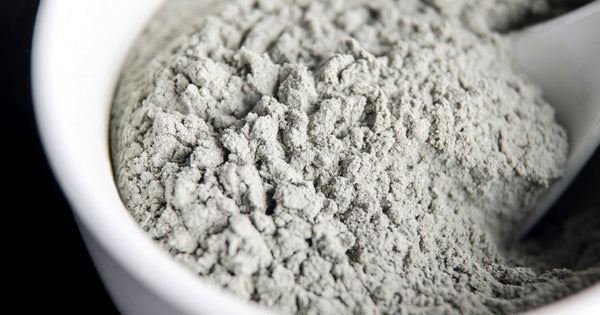Natural Bentonite Clay (B80) vs Activated Carbon In Cannabis Filtration
Jan 31, 2023

Are you looking to produce high-quality, pure and safe cannabis products that stand out from the crowd? Then you know that cannabis oil filtration is an essential step in the process that can't be overlooked.
With the cannabis industry booming, the competition for the best extract products has never been fiercer. The right filtration method can make all the difference between a mediocre product and one that stands out for its purity, aroma, and taste.
Among the most popular filter media options for cannabis filtration are B80 natural bentonite clay and activated carbon. However, there is a new game-changing filter media on the market: CRX by Media Bros. It’s already revolutionized how BHO is made.
This specialized filtration media not only removes impurities but also enhances the final product's taste and color, elevating it to a connoisseur-grade extract.
In this cannabis filter media guide, we will compare B80 bentonite clay, activated carbon, and CRX by Media Bros, and guide you through the pros and cons of each method, ultimately helping you make an informed decision that will take your cannabis products to the next level.
What Is Activated Carbon?

In cannabis oil filtration, activated carbon is an effective option to remove the impurities in crude extracts. Beyond botanical oil filtration, activated carbon filtration is commonly used in various industries to remove contaminants.
Activated carbon is commonly used in various applications, including water filtration, air purification, and medical treatments. Additionally, activated carbon can be used to remove impurities from gasses and liquids.
The activation process increases the surface area of the carbon to over 21,000 square feet and creates a highly adsorbent material that can remove impurities such as pesticides, chlorine, and chloramines from water.
But the benefits of activated carbon don't stop there. This powerful adsorbent can also be used to improve the taste and color of your final product, giving it a clean, smooth and enjoyable experience. It's the secret ingredient that can elevate your cannabis oil.
Activated carbon is made by heating carbon-rich materials such as wood, bamboo, coconut shells, or peat to high temperatures in the presence of a gas that causes the carbon to become porous and adsorb impurities like a magnet. Its ability to attract and trap impurities makes it a powerful tool in the quest for pure, safe, and high-quality cannabis products.
In cannabis color remediation, activated carbon removes chlorophyll and unwanted pigments from crude extract. Extraction technicians may also include silica gel, bentonite clay, diatomaceous earth, or activated bleaching earth alongside a layer of activated carbon material in a color remediation column (CRC) to improve its filtration efficiency and precision.
What Is Fuller’s Earth?
Fuller’s earth is a naturally occurring type of clay found in many parts of the world and is composed mostly of aluminum magnesium silicate. In cannabis oil filtration, fuller’s earth can decolorize oils and adsorb other impurities without using chemicals.
Its name comes from the textile industry, where textile workers, called fullers, cleaned raw wool using a mix of fine earth and water. The wool was kneaded into the mixture to adsorb dirt, oil, and other impurities from the fibers.
Fuller’s earth is primarily made of hydrated aluminum silicates containing metal ions such as sodium, magnesium, and calcium. The main clay mineral in fuller’s earth is montmorillonite, but it can have attapulgite, kaolinite, and palygorskite.
These clay soils have similar properties that make them good for filtration and may undergo acid activation to enhance these properties, such as porosity and surface area. However, acid-activated clay soils are more expensive than naturally occurring clays.
Because fuller’s earth is highly adsorbent and relatively affordable, it is used to decolorize cottonseed and soy oils, petroleum products, fats and oils, tallow, and oil from the cannabis sativa plant.
Although fuller’s earth is similar to natural bentonite clay, another commonly used filter media in cannabis, these substances have different silicate types. Fuller’s earth contains mainly aluminum magnesium silicate, while bentonite clay has calcium bentonite. Fuller’s earth can contain bentonite.
What Is B80 Bentonite Clay?

For cannabis filtration, B80 bentonite clay is a natural and cost-effective bleaching adsorbent used to remove impurities like a sponge without using chemical additives. Since the filter media is naturally produced, there is no risk of mineral acid carryover in the end product, making your products safe and pure for medical and recreational markets.
Natural bentonite clay has a unique ability to adsorb impurities due to its high negative ionic charge. When bentonite clay comes in contact with impurities, the negatively charged ions of the clay attract positively charged ions of the impurities, binding them together and trapping them within the clay.
Bentonite is a type of clay that is formed by the alteration of volcanic ash. It is composed primarily of montmorillonite, a clay mineral formed when volcanic ash is weathered and altered by prolonged and pressurized contact with water.
B80 natural bentonite clay used in cannabis oil filtration usually has a free moisture weight of 15.5% at 105º C, a neutral pH of 7.2 (5% solids in D.I.H2O), and a tamped density of 688.0 g/l. The particle size is 83% weight through 325 mesh (less than 45 microns).
This natural bleaching clay is classified as Generally Recognized As Safe (GRAS) by the Food and Drug Administration (FDA). The raw material is an intergrowth of smectite and hormite clay minerals, which are naturally adsorbent.
Natural bentonite clay is commonly used to produce butane hash oil (BHO) to bleach and decolorize crude extracts. It also removes phospholipids, soaps, heavy metals, and other color bodies such as chlorophyll.
Comparison of B80 Bentonite Clay and Activated Carbon
Cost
B80 bentonite clay is generally more affordable than activated carbon. The cost of B80 bentonite clay is typically around $80 for 14 kilograms, while activated carbon can cost around $75 per 1 kilogram or $3,600 for 100 kilograms.
This difference in cost is primarily due to the differences in the production process of the two materials. B80 bentonite clay is relatively easy to extract and process, while activated carbonl requires more advanced processing techniques.
Ease of Use
Both B80 bentonite clay and activated carbon are relatively easy to use. B80 bentonite clay is typically added in powder form, while activated carbon is typically added in granular form.
However, B80 tends to add unnecessary steps to the filtration process. Because it has to be baked first, typically in a vacuum oven, it can be a bottleneck for producers on automated systems. More B80 in a vacuum oven means less oil in the vacuum oven, which leads to overall productivity loss.
Not only does it clog up processes, it can also clog up extraction machines, adding valuable minutes to the extraction process. Most fullyautomated cannabis extractors utilize activated carbon “in-line” with a dedicated component CRC column that can be easily swapped out after each batch. B80 is much more difficult to work with in this type of application.
Since B80 contains trace amounts of respirable silica, wearing the proper respiratory protection can protect workers from the negative effects of prolonged exposure to respirable crystalline silica, which can lead to lung disease (silicosis).
Keep in mind that no scientific or medical data is available indicating that exposure to the dust from the product under conditions of normal use will cause silicosis. Proper personal protective equipment (PPE), including safety glasses or goggles. For operations where the exposure limit may be exceeded, an approved, high-efficiency particulate respirator and local exhaust ventilation are recommended.
With both B80 and activated carbon, extraction technicians use PPE such as respiratory protection, safety gloves, and safety glasses to protect themselves from inhaling the loose powder. Additionally, the workspace should have proper ventilation to prevent dust formation when handling the filter media.
Ability to Remove Contaminants
After the extraction process, both B80 bentonite clay and activated carbon effectively remove impurities from cannabis during the filtration stage. Activated carbon is an all-purpose filter media that allows extractors to remove heavy metals, pesticides, and color bodies. B80 bentonite clay can remove phospholipids, soaps, heavy metals, chlorophyll, and other color bodies.
Pros and Cons of B80 Bentonite Clay
Pros
- Naturally active adsorbent
- Affordable
- Relatively affordable
- Easy to use
- Neutral pH level
- GRAS-approved
- Good filtration properties, including long filtration cycles and less pressure build up at the end of the run
- Effective at removing impurities such as heavy metals (Ni, Mg, Fe, CA, P, etc.)
- Does not contain mineral acids or other chemical compounds
- Excellent for color bodies and chlorophyll removal
- Removes phospholipids
Cons
- Requires PPE
- Adds time to the extraction process
- Requires baking
- Filtration flow rates cannot be adjusted
- May cause respiratory irritation if not using the proper PPE
- Requires use outdoors or in a well-ventilated area
- Not as effective as other proprietary filter media like CRX by Media Bros
Pros and Cons of Activated Carbon
Pros
- Creates a more flavorful and aromatic cannabis oil
- Does not require baking
- In-line applications
- Adjustable flow rates
- Affordable for commercial use
- Large surface area
- Effective at removing impurities such as colors
- Can be used to remove impurities from other substances, such as water
Cons
- Generally more expensive than B80 bentonite clay
Other Types of Bentonite Clay
Activated Bleaching Clay
T-41 activated bleaching clay is a type of activated clay used to purify and bleach oils and fats. T-41 activated bleaching clay that has been treated with acid to increase its surface area and adsorption capacity.
T-41 requires special preparation instructions, including heating up the oil to 90º C, adding adsorbents, mixing for half an hour, cooling the mixture down to 40º C, and adding a solvent and a filter.
T-41 activated bleaching clay is known for its ability to remove impurities such as free fatty acids, color bodies, and other contaminants from oils and fats, resulting in a cleaner and more stable final product. T-41 has about 10% carbon. It is effective at removing pesticides alongside MagSil PR.
Activated Bentonite Clay
T-5 activated bentonite clay is a type of activated clay that is used for industrial filtration purposes. T-5 activated bentonite clay treated with acid to increase its surface area and adsorption capacity.
T-5 activated bentonite clay is known for removing impurities such as heavy metals, pesticides, and other contaminants from liquids, resulting in a cleaner and more stable final product.
T-5 is excellent for fast filtration and low clogging and is usually used as a bottom layer in filter beds, helping prevent fine particles from ending up in the final product.
An Alternative to B80 Bentonite Clay: CRX by Media Bros

In the highly competitive cannabis extraction market, every extra step toward achieving better oil matters. CRX-medium flow by Media Bros is an innovative solution to clearer BHO extracts without losing any aroma or flavor. In fact, the oil’s true flavors reveal themselves without being masked by pigments and impurities.
A significant advantage of CRX is its ease of use. Unlike other filtration media that require multiple steps and prepping, CRX does not require baking, prepping, or packing. CRX is an all-natural filter media that’s ready to use.
CRX’s granular form makes it simple to handle and load into a color remediation column and operate at high or medium flow cycles. If used properly, the filter media won’t clog, allowing you to get maximum filtration capacity.
Overall, CRX by Media Bros is an excellent alternative or supplement to traditional filtration methods such as B80 bentonite clay and activated carbon. It is more effective at removing impurities, while also improving the final product, and is more convenient to use.
Order your 1.5 kg, 10 kg, or 100 kg CRX volumes today and see the difference in color and clarity without losing out on yield.
Ask about a free sample to level-up your filter media today!






